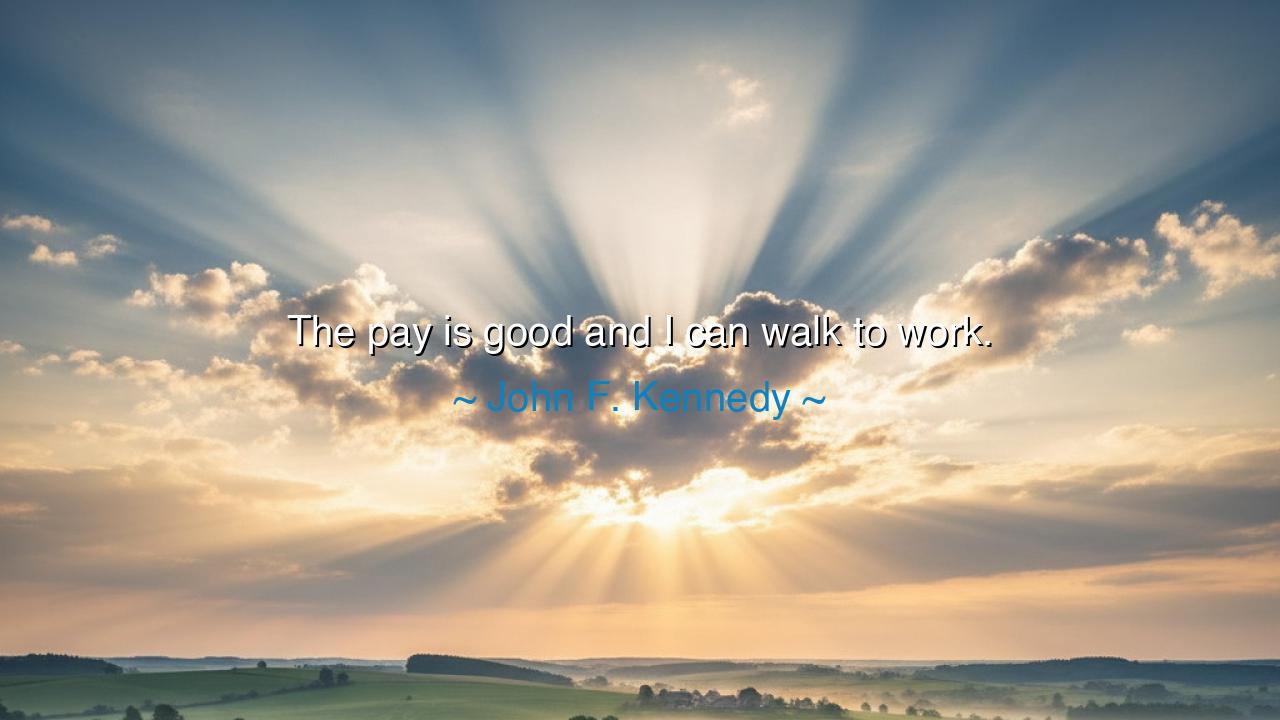
The pay is good and I can walk to work.






John F. Kennedy, with wit sharpened by both intellect and charm, once remarked: “The pay is good and I can walk to work.” Though spoken lightly, these words reveal a profound lesson: even in the highest office of power, life may be seen with simplicity, and greatness tempered with humility. The President, burdened with the fate of nations, framed his task in the language of the ordinary laborer, reminding us that even the mighty share in the common rhythm of work.
The ancients would have called this the wisdom of perspective. For men often dream of thrones and crowns, thinking only of power, glory, and wealth. Yet Kennedy’s words strip away the grandeur, reducing the role of President to its simplest measure: it is a job, with pay, and the convenience of being close to one’s dwelling. This is not mockery, but balance — a recognition that to endure great responsibility, one must also see its ordinary side, lest the weight of power crush the spirit.
The saying also speaks to gratitude. To say “the pay is good” is to acknowledge blessing, while “I can walk to work” celebrates the nearness of duty to home. In this lies a subtle lesson: contentment is not found only in riches or conquests, but in the small mercies of life — fair reward and the ease of daily journey. Kennedy’s humor cloaks a deeper truth: happiness is born not only from greatness achieved, but from appreciating the simple gifts within it.
The origin of these words lies in Kennedy’s playful nature, for he often softened the solemnity of politics with wit. Yet behind the jest rests a reflection of the ancient ideal of leadership: that the ruler must never lose sight of the ordinary man. By likening the presidency to any other work, he reminds the world that leaders, too, are servants, bound to labor daily for the good of others.
Let future generations remember: greatness is not always robed in solemnity. At times it is clothed in laughter, in simplicity, in the humility to see oneself as a worker among workers. Kennedy’s words teach that even the highest work must be balanced by humanity, gratitude, and perspective. For the truest leaders are those who can rule nations yet still speak with the humor and honesty of the common man.






JNJOHN NGUYEN
This quote made me think about how often we trade off convenience for higher pay. While a good salary is important, JFK’s statement suggests that the value of a job is also determined by factors like how easily we can get to work. Do you believe that the ability to walk to work contributes to overall well-being, and would you trade off a higher salary for a job that offers a better daily routine?
PHnguyen le phuong ha
John F. Kennedy's quote emphasizes two things that many of us seek in a job: good pay and a short commute. These are both key aspects that make life easier. But does this quote also point to the importance of reducing life's complexities and embracing simplicity? How much would your workday improve if you could walk to work every day, and is this enough to outweigh other job challenges?
TDTuyen DO
This quote makes me reflect on how simple pleasures, like walking to work, can make a huge difference in daily life. Sometimes, we get so caught up in chasing high salaries that we overlook the value of time and convenience. How often do we let stress from long commutes or poor work-life balance overshadow the financial rewards of our job? Can a lower-paying job with better balance be more fulfilling in the long run?
ANMai anh Nguyen
I love the practicality of this quote. While many of us are focused on earning a good paycheck, JFK seems to value convenience as a significant perk. Walking to work is a luxury many don't have, especially in large cities. Do you think this type of simplicity in daily life adds more value to your happiness than a higher paycheck, especially in the fast-paced modern world?
HLNguyen ha linh
This quote is interesting because it captures the idea that work doesn’t just have to be about the financial aspect. Being able to walk to work speaks to a lifestyle that prioritizes comfort and simplicity. How much does a good work environment, including factors like commute and convenience, play into your decision to take a job? Is job satisfaction really just about salary, or do non-financial factors matter just as much?